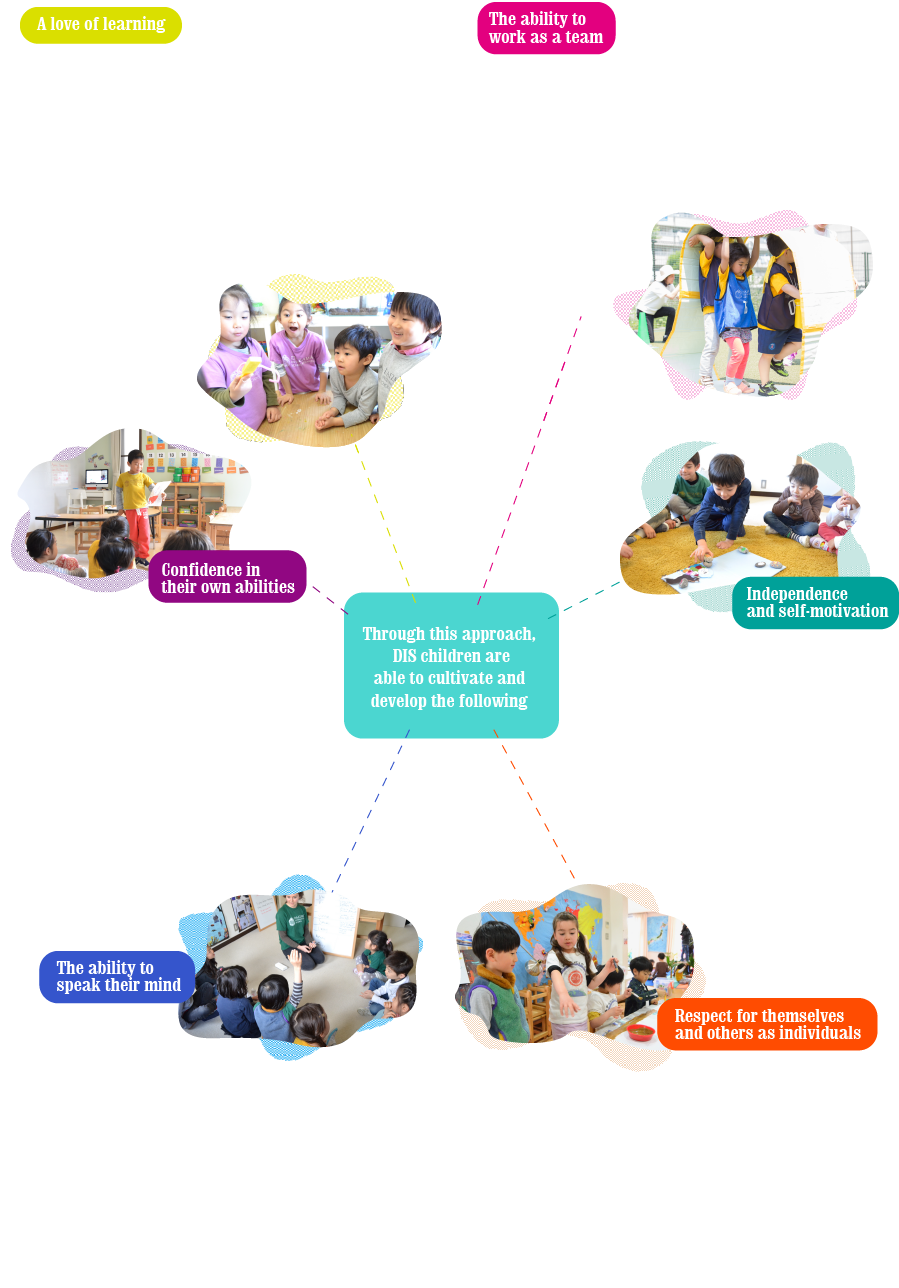At DIS we are strongly influenced by the style of teaching born in the small village of Reggio Emilia in Italy. At the core of our Reggio inspired approach is the belief that each child is fully capable of expressing themselves and communicating their interests. Because of this, we believe that the children can have a great deal of control over their own education.
The DIS Approach offers children an amazing array of experiences designed and curated by the teachers to reflect each child’s interests and strengths. As the children work alongside their friends and teachers to develop projects, they learn how to work as a team, complete research, become confident in themselves and their own abilities, and most importantly, develop a love for school and learning.
"個の輝きを重んじる”という理念のもと、
Daizawa International Schoolでは、
世界最高水準の教育といわれ、近年欧米諸国の著名幼稚園を中心に採用されている幼児教育法「レッジョ•エミリア•アプローチ」を
取り入れております。
様々なグループプロジェクトを通じ、子ども達1人1人の性格、強み、興味を尊重し、個の輝きを引き出しながら教育環境を作り上げていきます。
子供達が興味を示す事をモニタリングし、子供一人一人に対して、グループ全体に対して最適なカリキュラムを組み立てます。
これらの個々を尊重する日々の細かなケアにより、子供達は毎日新しい発見をしていくのです。
子供達の興味から、大きなプロジェクトへと繋がり、学習テーマに対する知識と理解をより深め、生涯にわたって使えるものへと発展させていきます。
子供達はグループプロジェクトを通じて、クリエイティブに考えること、問題の解決方法を培い、自分の強みを理解した上で社会にどう貢献できるかを知りうる事ができるのです。
この一つ一つのプロセスを経て、子供達は学びの楽しさを知り、将来に多種多様な学び方に対応できる力を身につけるのです。
A Reggio Influenced Approach
The Reggio Emilia approach was developed in the 1940s in the town of Reggio Emilia in Italy. The educators and parents in this community developed the approach with the goal of helping children become better citizens. The Reggio approach is flexible and is developed from children's ideas, thoughts, communication, and observations. The goal of the approach is to help children develop a lifelong passion for learning and exploration.
The Reggio approach gained a lot of attention in 1991 when experts at Newsweek magazine listed the preschools in Reggio Emilia one of "best top ten schools in the world”. Support and interest for Reggio continues to grow and even leading institutions like the World Bank and Google are advocating for the Reggio approach.
The goals of the Reggio approach and the DIS philosophy align perfectly and therefore Reggio was incorporated into the DIS approach to education and our mission to help children develop into confident and capable world citizens.
レッジョ・エミリア・アプローチはイタリアのレッジョ エミリア地区にて1940年に生まれました。教育者と保護者が共同で「より良い国民になるために」という想いのもと作られた教育法です。レッジョ・アプローチ教育には柔軟性があり、子供達のアイディア、想い、コミュニケーション、観察から発展させていきます。このアプローチの目標は生涯を通して学ぶ、追求することの楽しさを身につけることです。レッジョ・アプローチは1991年にNewsweek Magazineの「best top ten schools in the world」に選ばれ注目を集めました。レッジョへのサポート、興味は増大し、Google, 世界銀行をはじめとした一流の企業を中心に支持されています。レッジョ・アプローチとDISの理念が一致し、DISではレッジョ・アプローチをベースに子供達が自信に満ちた 「world citizen」に成長できるよう取り組んでおります。
DIS Children

今後あらゆる学びの環境を楽しめる子供達は、学ぶことに対して感情的なつながりを持っています。それは学ぶことの理由や、得られる喜びの理解に繋がり、今後の学業生活を大変有意義なものにかえていきます。
プロジェクトを通して公平性や他人のアイディア、
意見を尊重することを学びます。
それぞれの個性を尊重し活かすことで、子供達は自分たちのそれぞれ考えや、才能が他とは異なり、価値があることを認識し自信へとつなげます。
自分達で学ぶ方向性、内容を決めることにより自立心と自発性を養います。
DISでは子供達は自分達の考え、意見を共有する場を常に与えられます。自分の考えを伝えることの重要性を知ることにより、自分の興味や意見を自信を持って表現することができます。












